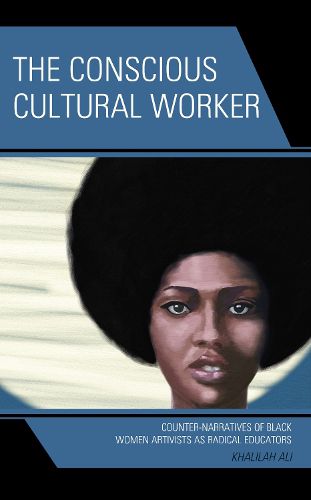Readings Newsletter
Become a Readings Member to make your shopping experience even easier.
Sign in or sign up for free!
You’re not far away from qualifying for FREE standard shipping within Australia
You’ve qualified for FREE standard shipping within Australia
The cart is loading…






The Conscious Cultural Worker: Counter-Narratives of Black Women Artivists as Radical Educators uses narrative inquiry and Black feminist and womanist pedagogy to look at the teaching identities and lived experiences of Black women artivist educators in the current neoliberal anti-woke moment. Their counter-narratives are presented as vignettes to look at a certain time in the lives of Black women artists who use rap, spoken word, or visual art to turn public places like bars, clubs, galleries, lounges, and alleys into unofficial educational spaces that the author calls "Communities of Reciprocity" (CoR). This book adds to what is known about situated learning, teacher identity, and the co-creation of communities of practice by focusing on the point of view of Black women as conscious culture workers. It does this by bringing attention to the fact that culture work is a kind of conversation between creatives as expert practitioners and audiences as spect-actors, who co-create liberatory educative texts. In this book, Black women "work" the culture by challenging hegemonic discourse and hidden curricula wherever people who want to learn come together.
$9.00 standard shipping within Australia
FREE standard shipping within Australia for orders over $100.00
Express & International shipping calculated at checkout
The Conscious Cultural Worker: Counter-Narratives of Black Women Artivists as Radical Educators uses narrative inquiry and Black feminist and womanist pedagogy to look at the teaching identities and lived experiences of Black women artivist educators in the current neoliberal anti-woke moment. Their counter-narratives are presented as vignettes to look at a certain time in the lives of Black women artists who use rap, spoken word, or visual art to turn public places like bars, clubs, galleries, lounges, and alleys into unofficial educational spaces that the author calls "Communities of Reciprocity" (CoR). This book adds to what is known about situated learning, teacher identity, and the co-creation of communities of practice by focusing on the point of view of Black women as conscious culture workers. It does this by bringing attention to the fact that culture work is a kind of conversation between creatives as expert practitioners and audiences as spect-actors, who co-create liberatory educative texts. In this book, Black women "work" the culture by challenging hegemonic discourse and hidden curricula wherever people who want to learn come together.